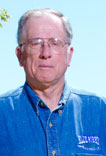 Clark Collins has a long and storied history of advocating for the rights of off-highway vehicle (OHV) riders, from the creation of the public land-access group the BlueRibbon Coalition (BRC), to building regional and national coalitions among all trail users, to his instrumental role in the passage of a federal law to dedicate user-paid monies for trail funding.
Clark Collins has a long and storied history of advocating for the rights of off-highway vehicle (OHV) riders, from the creation of the public land-access group the BlueRibbon Coalition (BRC), to building regional and national coalitions among all trail users, to his instrumental role in the passage of a federal law to dedicate user-paid monies for trail funding.
Born on Dec. 19, 1941 in Idaho, Collins caught the motorcycling bug while serving in the Navy in 1962 when he and a friend rented a Vespa scooter in Rome, Italy.
"It’s a wonder we weren’t killed," Collins recalls. "I learned to ride that thing on busy streets. When I got out of the Navy, I wanted to get a motorcycle. I started out on an 80cc Suzuki, and worked my way up to a more serious dirtbike, a 1964 Bultaco Matador."
In Idaho, Collins raced cross country. Then, when he saw local riding areas threatened with closure in the 1980s, he focused his energies on advocacy for OHV riders. His concern about trail closures led to his creation of the BRC in 1987, a national non-profit organization dedicated to protecting responsible recreational access to public lands.
The BRC "started because a bunch of politicians were supporting a Wilderness designation for one of our local riding areas," Collins says. "I got together with a bunch of other OHV enthusiasts, and we turned around all of the political support for the Wilderness designation—except for the governor. An aide kept telling me he wasn’t backing away from it, but I finally got a chance to meet with him. He told me to my face—He said, 'You folks are politically insignificant.' He used just about those words. I thought maybe I needed to do something about that."
That governor decided to run against U.S. Sen. Steve Symms (R-Idaho) in 1986 and Collins decided, as a result, to organize OHV riders to help Symms in his re-election bid. Symms earned his re-election, and the BRC was officially born in 1987.
In 1990, Symms remembered the help he got from the OHV riding community, which prompted him to introduce, and fight for, the National Recreational Trails Fund Act at Collins' request.
The National Recreational Trails Fund Act, also known as the Symms Act at the time, became law in 1991. That program is now called the Recreational Trails Program (RTP), and it is considered to be one of the most important and beneficial laws for OHV riders ever passed by Congress.
The RTP provides funds to the states to develop and maintain recreational trails and trail-related facilities for both non-motorized and motorized recreational trail uses. The RTP is an assistance program of the U.S. Transportation Department's Federal Highway Administration (FHWA). The RTP program benefits hiking, bicycling, in-line skating, equestrian use, cross-country skiing, snowmobiling, off-road motorcycling, all-terrain vehicle riding, four-wheel driving, or using other off-road motorized vehicles.
The RTP funds come from the federal Highway Trust Fund and represent a portion of the federal motor fuel excise tax collected from non-highway recreational fuel use. In other words, taxes generated by fuel used for OHV recreation – by snowmobiles, all-terrain vehicles (ATVs), off-highway motorcycles and off-highway light trucks – fund the RTP for both motorized and non-motorized use alike.
The RTP funds are distributed to the states by legislative formula—half of the funds are distributed equally among all states, and half are distributed in proportion to the estimated amount of non-highway recreational fuel use in each state. (To see funding levels by state, go to http://www.fhwa.dot.gov/environment/rectrails/recfunds_resc.htm.)
"The lesson there was that you can influence the process," Collins says. "There are a lot of people who get frustrated when it comes to political process, saying, 'We can’t affect what happens in Washington.' They don’t even try."
In 2005 Collins was featured in “Outside Magazine” as one of twenty people on their list of “Earth Shakers: The counter-enviro power list.” http://outsideonline.com/outside/features/200505/counter-enviroment-power-list-19.html Collins was also a 2006 inductee into the Off Road Motor Vehicle Hall of Fame in the “Pioneer: Advocate” category. http://www.ormhof.com/inductees/Clark-Collins.htm
Collins retired as executive director of the BlueRibbon Coalition in 2006. But he couldn't stay away from fighting for OHV riders' rights for long. In 2009 he began working with ATV organizations in Idaho, serving as president of the Idaho State ATV Association.
Collins was inducted into the Motorcycle Hall of Fame in 2010.